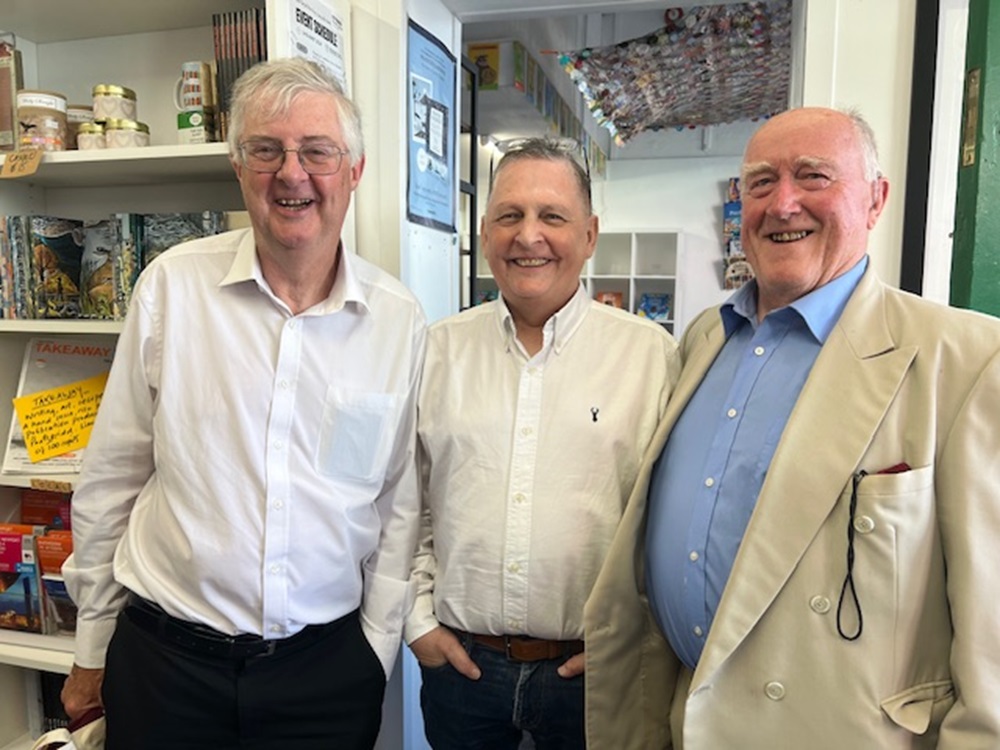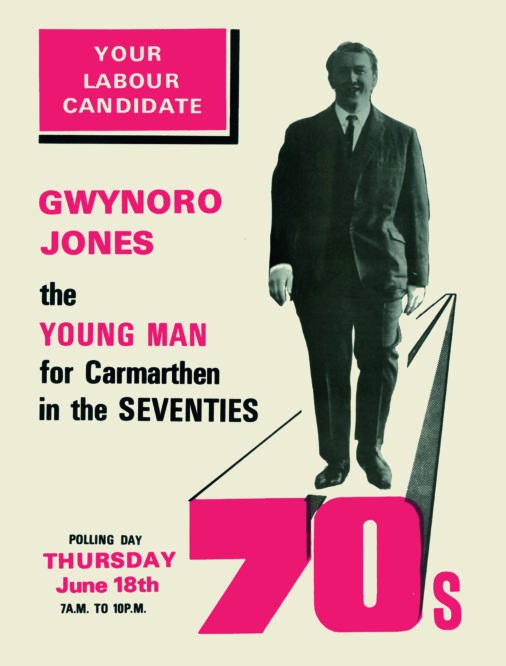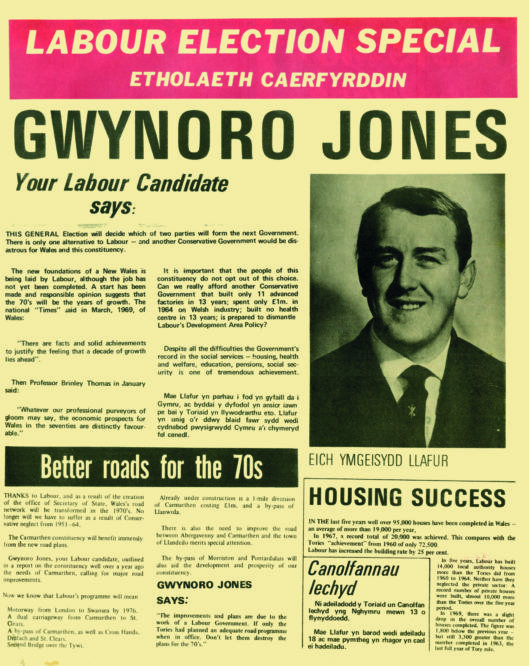I am here with your Member of Parliament, Mr Gwynoro Jones

Mark Drakeford
I close my eyes to focus better, because this is now a long time ago.
It is 1967. I am twelve years old. It’s Whitsun half term and the Urdd Eisteddfod is taking place in Carmarthen Park, three minutes’ walk from home.
My brother and I have already been with my mother to the opening Gymanfa Ganu, unnerved by being separated from her in that great crowd, because, in 1967, men and women, and even boys and girls, must be divided for harmonic purposes.
It’s also the last time I was to see tonic sol fa printed alongside the emynau, because, as I said, this is a long time ago, closer to the First World War and the only Welsh Prime Minister than we are to 1967 today.
I’ve come back to the Eisteddfod by myself in the week, on a hot early June day. I’ve borrowed an early simultaneous translation device from the BBC stand because, while I hear Welsh spoken every day, nobody at home ever speaks Welsh to me.
Out of a device which looks like a large wooden spoon I can hear the voice of that great broadcaster, Alun Williams, and he is translating the speech being given by a man I can see on the stage a long way away and whom I know very well to be Gwynfor Evans.
Groundbreaking
Tall, white haired and faintly aristocratic, it is almost a year since his groundbreaking victory in the Carmarthen by-election. I’d spent nearly a year at Carmarthen Boys Grammar School where a collection of English-only road signs could be found dumped in the carpark in the morning, and where much older boys would come up to you in the playground, shake hands, and say in a solemn voice, ‘Gwynfor’.
Here he is, in every sense, in front of a home crowd. His platform speaking style is underwhelming, but what sticks in my memory the most is a passage where he tells his audience that:
‘the rise of nationalism in Wales is like the tide beating on the shore.
And it’s coming in.
It’s coming in.
And it’s coming in’.
And by the third iteration, the crowd in that hot and airless tent were on their collective feet, roaring their approval.
And I didn’t like it, one bit.
Fast forward now to October 1974, seven years and, at that age, a lifetime later.
About half-way through that period I’d already made my mind up (and for a lifetime) that I was a socialist and not a nationalist.
Foot soldier
For the first time, I was about to steel myself to be a foot soldier in the Labour army knocking doors to support my heroes in what remains the most talented Cabinet, yes, of my lifetime.
At 10 o’clock we’ve assembled at St John’s car park. I am with Richard Edwards, then as now, a fellow socialist, and we are dispatched to spend the morning canvassing the good citizens of White Mill, just outside the town. Our small team is led by a lovely man, and lecturer in English at Trinity College, Don Dale Jones. He is, however, incorrigibly and (in the White Mill context) unfathomably English himself.

Neophyte door knockers in the Labour Party, at least, are generally advised to watch another more experienced practitioner, before having a go themselves.
Don’s example was to raise his deer stalker hat, as he marched towards the voter (always a ‘housewife’ at home in 1960s Carmarthenshire) and to say, in a voice which began loud and, deploying a crescendo which Rossini would have envied, ended in a boom which ran, ‘Madam, I am canvassing you on behalf of the LABOUR PARTY’.
Terrified
I’m not sure what effect it had on the voters, but at the age of nineteen it certainly terrified me.
For the afternoon session we were taken far away to the northern end of the constituency and the village of Cwmann, and a further addition to our crash course in canvassing. We were to be ‘knockers up’, calling voters to the doorstep and holding them there long enough to experience the magic of meeting the candidate.
Only, in this case, it really was magical. We’d been taken to meet the candidate, and the Member of Parliament with the smallest majority in the House of Commons in an equally small café before the session began. I thought I had never seen anyone who looked more exhausted.
Gwynoro Jones, for it was he, was slumped over a cup of tea, looking every bit a man who believed that a majority of three was unlikely to see him home.
Until, that is, a voter came into view. At a distance of fifty yards, it was like a light came on inside Gwynoro. He straightened up, thrust out his hand and got ready to impress. And in 1960s Cwmann, he did just that.

This was canvassing I could manage, and even enjoy. Voters (still housewives in the afternoon) would answer the door dressed in a pinny and slippers. I would say, in Welsh just good enough for the purpose, ‘I am here with your Member of Parliament, Mr (note the ‘Mr’) Gwynoro Jones. He’d really like to meet you’. And with a cry of alarm, my interlocutor would disappear back into the house and reappear in shoes and something suitable for meeting a Member of Parliament in those deferential days.
By then, Mr Jones himself had appeared on the doorstep, and I could move on to the next knocking up, before any awkward questions could be raised.
Gwynoro was, in many ways, the antithesis of the Gwynfor Evans I remembered from 1966.
Short, where Gwynfor was tall; a young man, where Gwynfor was not, and very clearly more at home on a Carmarthenshire doorstep than I could imagine the more reserved, slightly aesthetic President of Plaid Cymru.
Gwynoro’s Welsh was the language of the chapel, not the text-book. It bubbled up and flowed out of him, as the hymn says, ‘without ceasing’. Whatever his later political peregrinations (and I knew, even then, that someone who had served as a personal private secretary (PPS) to Roy Jenkins was hardly likely to belong to ‘my’ part of the Party) he was the embodiment, that day, of a message which I’ve remembered and tried to live up to, ever since – that in Wales, you don’t have to be a nationalist to prove that you are Welsh.
The above extract is from the book Only Three Votes, Published by Parthian and available here
Support our Nation today
For the price of a cup of coffee a month you can help us create an independent, not-for-profit, national news service for the people of Wales, by the people of Wales.





Da iawn Drakes! Book looks interesting….looking back, that period was setting the scene for the next 50 years in Welsh Politics!
Unfortunately Mark Drakeford has misunderstood the concept of nationalism, especially Welsh nationalism throughout the entirety of his life, and even more unfortunately, he’ll be too stubborn to be willing to learn.
Absolutely! To be a Labour supporter you have to accept, and support, the concept of British Nationalism and Unionism. Drakeford is an intelligent man so he is therefore deceiving people if he talks about his socialism but not his nationalism.
100%. Labour is an imperialist party and real socialism cannot coexist with imperialism
Listen to a Plaid Cymru ‘nationalist’ and a Welsh Labour patriot and you will often find it hard to tell the difference.
So Mark is a BritNat rather than a WelshNat. Britain, the so called union of equals.
For decades, ‘Gwynoro’ was practically a swear word in my house. Mention his name and you’d get looks like you’d just suggested adding English mustard to Welsh cakes. Fast forward to today, and in a twist that even Shakespeare couldn’t have scripted, he’s somehow been rebranded into a figure who’s actually liked by nationalists—even Gwynfor Evans’ own family! And here’s the kicker: it was Gwynoro who unveiled the plaque to the former Plaid Cymru leader in the Guildhall—at the family’s request, no less. If you’d told my family back in the day that one fine morning Gwynoro would be honoring… Read more »